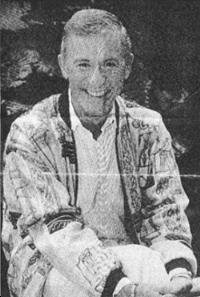
From his ever popular role in the Planet of the Apes, to his 1960 Tony Award for supporting actor in The Fighting Cock and numerous unforgettable roles in classics such as Cleopatra and the "Lassie" series, Roddy McDowall all but defines the term "working actor." But today the English-born actor’s focus is primarily on giving back to the industry that has cradled him since childhood. His passion for charity, and more specifically The Motion Picture and Television Fund, has ignited a different side of the child-star turned veteran thespian. He speaks as excitedly about working with the fund as he does about co-starring with Sissy Spacek in the forthcoming film The Grass Harp. "It’s a part I am very much looking forward to. I’m thrilled to work with such talented actors, but more importantly I am happy that people still enjoy my work," he explains. For years viewers have been enjoying the work of McDowall, for not only the eccentric roles he chooses, but the risks he takes in portraying these characters. As a child with saucer-like eyes with an adventuresome spirit, he taught us to love an oversized dog named Lassie in the series "Lassie Come Home." Later in his career, he set the tone for sci-fi TV in the ‘70s with his role as Cornelius, "a passive ape scientist" as one source describes it, in the cult favorite, "The Planet of the Apes." The forums for his creativity soon grew from his acting and McDowall eventually delved into producing, directing and still photography. It was his love of making movies that led him to try his hand at producing, and in 1946 he was the associate producer of Holiday In Mexico. As the success of the film (and dozens thereafter) marked another notch in his belt, it became clear that McDowall was as comfortable behind the camera, as he is in front of it. McDowall’s knowledge of old films and film preservation is another focus of his attention, as though saving the past will help him to understand the future. As an avid collector ("I collect everything, even if it’s a disease," he teases) of industry paraphernalia, McDowall is quite verbal about the need to "rescue" the thousands of poorly stored film reels in risk of being damaged. "I have a great interest in film preservation because it is a link for filmmakers to understand history. I’m fascinated with history in general. But the history of films and acting is so very important; if we’re going to try and understand it, we have to learn to preserve it correctly. Photography has been yet another one of the vehicles for McDowall’s creativity, and perhaps the least well known. His photographs have illustrated the record jackets of Barbra Streisand and Judy Garland, and have appeared in magazines such as Life, Vogue, and Playboy, among others. He is reluctant to talk about the four Double Exposure books of his personal photography, and even too humble to admit that the proceeds from those books benefit The Motion Picture and Television Fund. The fund, that was established in 1921, is McDowall’s primary concern today. He spends significant time focusing on the needs of the organization that provides assistance to members of the entertainment industry. "It is a work force that is phenomenal. It is a discreet and private place for people in the industry who need support. They help first and ask questions later. This fund is where my focus is, I want people to be aware of this very, very important place." McDowall has been working with the organization for many years, serving in several capacities. His involvement does not end with the financial contributions from his book royalties, but merely starts there. President and CEO of the fund, William F. Huag speaks sincerely about McDowall’s hands-on involvement. "He works so quietly behind the scenes, it is impossible for anyone to know how many things he has made possible through his own dedication. If a phone call needs to be made, Roddy is on the phone. He is a truly selfless man." McDowall plays down the compliment and notes that "their motto is ‘We take care of our own,’ and that is so important to me. They respect people’s privacy and let them keep their dignity. I can empathize with that. I personally don’t think that my private life or my private views are public property. Because we’re in the same industry, they understand that." It is this kind of mentality that has kept Roddy McDowall on top of the industry for so many years. By vehemently defending his privacy and that of others, he has allowed himself to pursue a career without parameters. He is quick to explain that his profession is "simply a business. It’s what I do," and that merit, if any, should be given to those who use their profession to facilitate change. His back-to-basics philosophy and perserverence mentally, professionally and philanthropically are what have allowed him to endure an ever-changing industry, with a strong sense of reality and unadulterated grace. —SAMANTHA FEIN
BEVERLY HILLS [213] November 23, 1994 |
RM Tribute: Frames | RM Tribute: No Frames | Contact Us | Musgrave Foundation